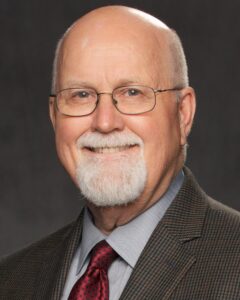 Project Pedagogy and Retirement: Providing Free Communication Curriculum
Project Pedagogy and Retirement: Providing Free Communication Curriculum
For Christian High Schools
Gary Rybold, PhD, Professor Emeritus, Irvine Valley College
I competed in forensics for four years of high school and four years of college. In the corporate world I was in sales, training, and management. Now, freshly retired from 30 years of
coaching forensics and teaching communication courses at a community college, my third act
turns towards the development of free communication curriculum for Christian high schools and homeschools.
I had a secular education. I did not have a relationship with Jesus Christ until I was 45. I didn’t get my PhD until I was 60. As a late bloomer, I still hope to be effective in providing Christian educators with additional tools for developing confident Christian communicators.
Over the past 15 years, a project pedagogy for public speaking and debate classes has evolved in hundreds of community college classrooms. Dozens of instructors I mentored shared with me their successes, failures, and modifications. After my department became involved with dual enrollment classes for high school students, I volunteered to teach six sections of freshman (the same grade level when I discovered forensics) in both public speaking and debate classes. I found the project pedagogy as effective with these younger students as it is with older adults and the ESL students often enrolled in community college.
As in most public speaking classes, the core lecture concepts involve delivery, organization, research, speech construction, listening, and anxiety reduction. To facilitate internalization of these concepts, the project pedagogy also incorporates two other concepts. First, critical thinking as a system provides a common language of assessment throughout the course. Second, collaboration skills provide a pathway for working effectively on group tasks.
The primary premise of a project pedagogy is to engage students in speaking activities every day. Class activities follow the principle of a “typical repeatable day.” In the first third of the term, students write short papers on chapters in the textbook. They read those papers in small groups and collaborate through peer assessments. When speeches start, small group collaborations continue with each student giving a speech during each class meeting. Rather than an instructor assessment, each small group is responsible to dynamically assess their practice speeches. The instructor assesses only one speech for a grade after a student is certified by their small group as ready to “test-out” (testing at the point of success).
By the end of the semester, the typical student will speak, using critical thinking concepts, at least 130 times. With short papers and self-assessment journals, each student will write over 30 pages. The minimum number of informative/persuasive speeches delivered per student is twenty. This quantity of speeches matches the repetition used to help forensics competitors become confident and competent. And the type of interaction practiced from the beginning of the class fosters community.
The project pedagogy also succeeds in debate classes. In the beginning third of the course, students assess chapter concepts in small groups. After these lecture sessions, several small group debates take place simultaneously at every class meeting. It is possible for a student to debate 8-10 times in the lower stress environments of small groups. Students also serve as adjudicators and orally assess when not debating.
I had a lot of success with the project pedagogy with a variety of students. Once I decided to retire, I put my energy into writing project curriculum for Christian teachers who want deeper learning opportunities. In my new mission, I am freed from the constraints of secular education. Secular education has changed dramatically in the last 30 years. Critical theory, once an esoteric philosophical argument rarely encountered in debate, has now become the guiding principle for public schooling. For example, last year the California legislature mandated ethnic studies for all college undergraduates. The curriculum looks like a Neo-Marxist training manual.
With the help of friends, I developed a website to share the curriculum: www.projectcom.org. This website provides free materials as an open educational resource (OER). Site visitors can read a journal article on the development of the project pedagogy, a detailed instructor guide used for lower division college classes, book recommendations, and a section with Open Educational Resource (OER) curriculum materials specifically aimed at Christian high school classrooms. The OER curriculum offers a day-by-day instructor guide, ppt slides, and handouts. I designed the curriculum as “plug and play” where the teacher will not need a communication studies degree to facilitate the learning. Hopefully, detailing an easy-to-use curriculum and providing materials at no charge will help lower the cost of Christian education.
I have no interest in going back to secular education. Now that that I have retired from public schooling, I can now speak the truth of the Gospel freely in my materials and help Christian teachers bring out the mastery of communication skills in their students.
I hope you will share the website with all Christian educators you know.
Gary Rybold, PhD
Professor Emeritus
Irvine Valley College
Gary.Rybold@projectcom.org
ProjectCom.org
